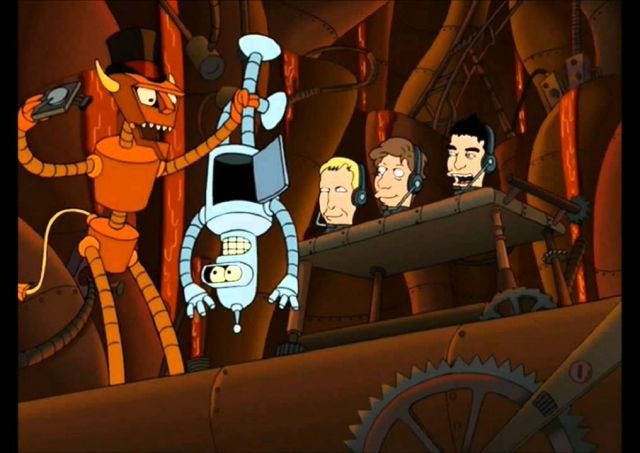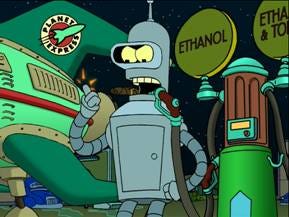So What, Who Cares (vol 3, issue 15) How Futurama Is Actually Getting the Future Right
Hello!
So, was there any other news out today?
*

The robots are coming for our jobs. So what will anyone do about it? If this sounds hyperbolic, consider the impact automation has already had on the American workforce. From 2000-2010, approximately 5 million manufacturing jobs were eliminated, and according to researchers at Ball State, automation accounted for 87% of the jobs that went away. This trend will likely continue: A recent McKinsey report estimated robots could take over another 50% of jobs that exist today.
"My Roomba gets confused by the stripes on my carpet," you're saying. "How on Earth are we going to get to a point where it's running the Q4 sales reports?" Let the McKinsey report tell you: robots are good at doing jobs that require predictable physical work (i.e. repetitive work like screwing in bolts), data collection, or data analysis. Robots are not good at doing unpredictable physical work, and as anyone who's ever asked Siri a question knows, artificial intelligence has a long way to go before the machines are communicating as efficiently or effectively as two humans in conversation.
But the specter of rising unemployment raises a question: What should the government do -- if anything -- to shepherd its citizens through the next wave of technological disruption? Bill Gates has opined that governments should tax companies when they replace human workers with robots, arguing that the income could then be used to boost the salaries of, say, elderly caregiving -- a task not yet consigned to the robots, though there have been inroads there too -- and other people who do the labor of caring for others, from childhood to adulthood.

So what? Automation is not going to go away. It represents a significant cost savings for most industries that deploy it. Remember that Otto is claiming their $30,000 technology for long-haul trucking could eliminate one $40,000-a-year human driver. And in the same period where manufacturing lost 4.35 million jobs to automation, the overall output of U.S. factories peaked before getting walloped by the 2008 recession. As of right now, U.S. manufacturing output is back near the all-time 2007 high and U.S. factories produce twice as many goods as they did in 1984, only with a third of the workforce.
Automation has been very good for manufacturing, and other businesses that want to reduce the costs associated with employing people while also boosting productivity is going to be looking for ways to incorporate automation into the processes by which it produces its goods and services.
There's a lot of understandable anxiety about what workers will do when a combination of machines and machine learning take over their jobs; optimistic types argue that in most jobs, artificial intelligence and automation will enhance a worker's productivity.
There's also some curiosity as to whether or not governments are going to let robotics development proceed unchecked, or if they're going to start looking at rising corporate profits and a shrinking base of taxpaying citizens and decide, "It's time to get involved for the good of the state." Critics of government taxation have two concerns: That any tax scheme won't be able to distinguish between assistive technology and augmentive technology. (The basic difference: the former my your spellcheck, the latter writes this column for me.)

Their second concern is that government taxation and regulation of robotics would have a chilling effect on innovation. Their concerns are grounded in history: Queen Elizabeth I famously refused to issue William Lee a patent for his stocking frame knitting machine, citing her concern over the displacement of workers in the hand-knitting industry.
Who cares? Anyone who is interested in remaining employed and/or solvent through the next few decades. This is also going to become a fairly chewy topic for tech policy types -- who will have strong opinions on whether, when or how a government should regulate a technology in the interest of protecting industries.
A concern among people who are watching the rise of automation is that it will only exacerbate ever-growing inequality. A recent Bloomberg op-ed noted that wages in England fell for the first four decades of the Industrial Revolution; the suggestion there was to redistribute capital income more broadly, because "This would essentially redistribute some of the income produced by the robots, giving every citizen a stake in the new automation economy."
Perhaps figuring out what people should do when the robots take their jobs is the kind of question we can ask the robots.
*

Your pop culture recommendation of the day: One of the unintended consequences of doing this gig for The Observer plus podcasting all through the Incomparable's membership drive -- I got to be on a hockey
podcast with Erika and Deb! And it's available only to members! -- is that I haven't had much of a chance to
read for pleasure lately.
But I did manage to finish the Cut's "Why Manic Panic Hair Dye Is Still Cool", and it reminded me of Atlas Obscura's scrappy oral history, "Manic Panic Isn’t Just a Hair Dye Brand: It Was the First Punk Store in America."
I like both of these pieces because they pull out a viewpoint not often seen in punk journalism, i.e. that of women. I'll still recommend Legs McNeil's Please Kill Me: The Uncensored Oral History of Punk or Michael Azzerad's Our Band Could Be Your Life: Scenes From the American Underground 1981-1991, but these articles on Tish and Snooky Bellomo are snapshots of a more female experience in punk rock and Long Island City life thereafter.
*

